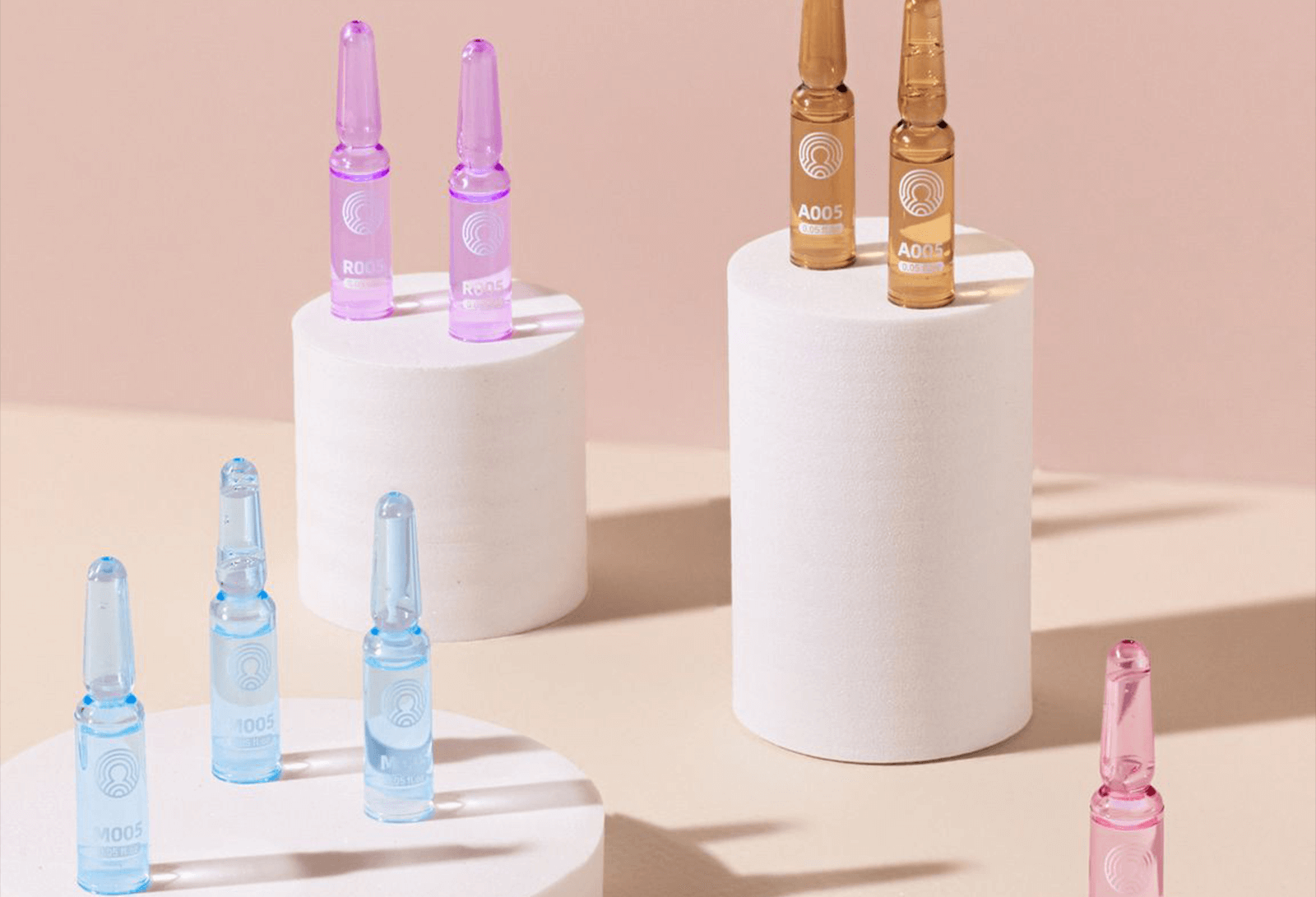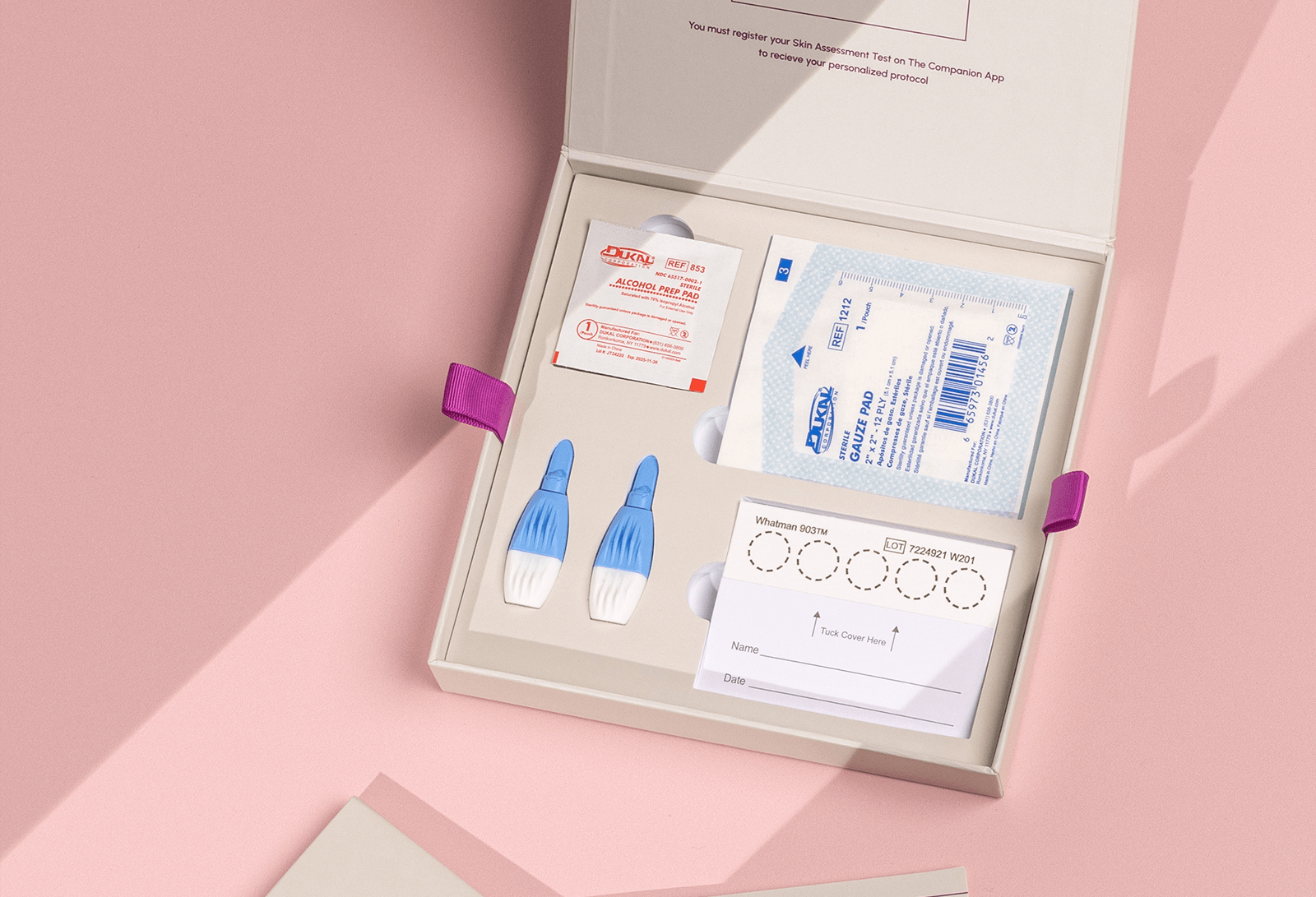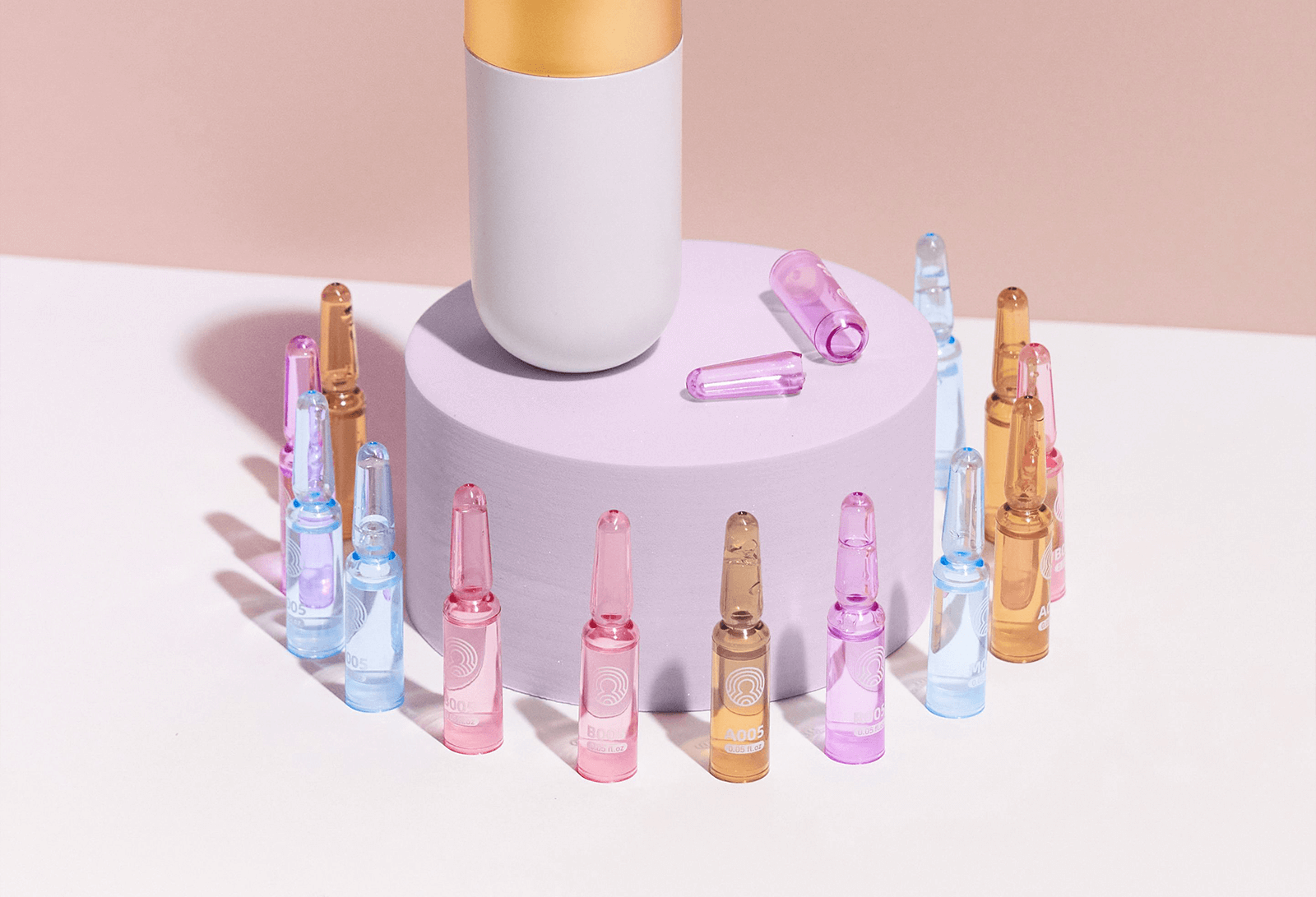Skin reflects both our outer and inner worlds. Comodegnic ingredients can cause acne, but so can an imbalance of hormones. UV rays cause the skin to age prematurely, but our biological clocks ticking away cause wrinkles too. And yet, the epidermis has predominantly been targeted and marketed to with surface-level products only.
Iuno marries both worlds, offering proteomics-driven, customized skincare solutions by measuring the proteins in the blood (approximately 3,000 of them for a comprehensive test result), which the company states is responsible for “83% of skin concerns.”
An at-home finger prick test is sent to iuno’s partner lab, Olink, which then analyzes this proteomics sample and sends out a 28-day skincare routine; the day count is in accordance with the skin cell renewal turnover rate. The first two weeks of the skincare kit are focused on priming, before going into a more actives-focused regimen. The dose of actives gradually increases between months two and three to ensure an efficacious but not skin barrier-disrupting treatment. With 60,000 possible combinations, it’s a highly customizable model, but the main categories of care options include hydrating, repairing, renewing, and brightening variations. Customers also receive a personal proteomic test. The ampoules are applied with a misting device for even and hygienic distribution. According to the brand, the mister also allows for “20 times deeper penetration.” Thanks to the accompanying AI skin-analysis app, with a simple selfie users can monitor skin progress and also fine-tune their skincare protocol. At the end of the 90-day treatment, customers receive another blood test kit to measure the results of their protocol and also determine the dosage and content of the next round of ampoules.
Prior to co-founding the company with husband and synthetic biologist/interdisciplinary scientist Dr. Ashwin Gopinath, Dr. Thubagere―whose original background was in electrical engineering―became interested in the bioengineering world. Studying for her PhD in bioengineering at California Institute of Technology (CalTech), she built a biological breadboard (a construction base for electronic circuit prototypes) consisting of DNA robots on DNA origami. This unusual work, published in an academic journal, caught the eye of Sergey Brin, the Google co-founder and one half of the founding team of X, Google’s research arm and innovation lab for moonshot-based businesses.
Invited to speak at X on her findings, Thubagere was immediately hired to join the X team. “I've always been a curious person. I don't know if it's nature or nurture, but anything that's complex and I can crack, I get into it full steam,” Dr. Thubagere tells BeautyMatter. The newest focus of that perpetual curiosity is the world of skincare—from engineering machines to engineering skincare formulas.
“I worked on a bunch of different projects looking at how data could be applied to biology. At that point, I started to realize you could break down the human into different compartments, but there was a very cohesive content there that you could put it all back together. That's when I got excited about skin, for example; it’s such a fantastic sensor,” she states.
Her increased interest in dermatology became all the more imperative when in 2014, at the age of 27, she was diagnosed with leukemia, shortly thereafter receiving chemotherapy treatments. “I expected my hair to fall out; people talk about it all the time. But nobody talks about your skin. Coming across the changes that chemo brought in and watching myself change in the mirror day-to-day, it feels like it was my destiny to get into understanding skin as an organ and help people reach their best potential by understanding what is happening inside and outside through their skin,” she says.
Dr. Thubagere was able to get the founder of Fitbit, Eric Friedman―whom she met through working on building out testing platforms for the fitness brand―on board with her premise. “We were talking about this idea and he's like, ‘You need to go do this outside. Just go out and I'll support you.’ He was the first person who pushed me out and said just go build this outright,” she recalls. Through Friedman and other advisors, including Caltech, MIT, and George Ruan (the CEO of Honey), she was able to make that vision a reality.
“I've been fortunate enough to have a good network of people that we brought together to make something real. Skin is one of the most important organs that we have; it's your barrier to the outside world. That's one of the major things I want to bring into this [skincare] space is to start taking your skin seriously, stop putting shit on it, and treat it with the respect that it deserves. Understand it and nurture it,” she proclaims.



The ensuing technology she developed was built on a preexisting format, but one which hasn’t seen adoption across the personal care industry. “Proteomics has been used by the pharmaceutical world for decades now;it’s just that it's boring enough that people have not brought it to the consumer market. With the quantified self-movement now gaining more traction, it's the right time to be bringing proteomics to the forefront,” the co-founder explains. Speaking about why these technologies haven’t seen adoption in the beauty industry before, the scientist reflects: “It’s the vision, the need to want to change something. Why did Google come in and take over the world? It wasn't that we didn't have search engines before, or the technology or internet didn't exist. The way they wanted to integrate the technology into people's lives, that is what brought Google to life.”
Dr. Thubagere and her team data-mined decades of research and clinical studies to start building the primary models. They then partnered with Olink to complete the rest of their algorithms. “We had the opportunity to partner with them and they were able to give us a massive data set that we could learn on, because for them, seeing this technology come to the market to be able to improve people’s life and health is just as important. We both gelled very well on the vision,” she says of the partnership.
Along the way of figuring out what formulations the duo wanted to bring to market, she connected with a South Korean manufacturer who had designed serums built on supramolecular chemistry, which, as Dr. Thubagere explains, “neutralizes the parts of the molecule that can trigger an immune response so it's tame, but effective.” Iuno also works with the Stanford Skin Innovation and Interventional Research Group; the group’s co-director, Dr. Justin Ko, also sits on iuno’s advisory board, alongside other industry figures such as Pacific Biosciences CTO, Stephen Turner.
Creating the accompanying AI-driven app to accompany the skincare treatments offered a way for consumers to track the results of the product in real time. Its machine learning algorithms have been trained with more than 50 million images across all ages, genders, and ethnicities and examine 149 different parameters of the skin. For consumer ease, the app dashboard presents the six most relevant parameters for a person’s skin needs and desired outcomes. “You have three months to see the changes in your body, but people in the world of TikTok and Instagram are used to having more instant gratification. Part of the reason for us to create the app was to give the user a way to quantify whether that product is working for them or not, providing users with more touchpoints on using the product,” she notes. The app also has a chat function for any consumer queries.
Iuno’s premise is indicative of the recent surge in science-led, AI-driven, customizable skincare options, but weaves that narrative into every fiber of the brand’s DNA. It also speaks to the curiosity of consumers wanting to know the hard facts about why certain ingredients are helpful to their skin where others may have failed. It’s an efficacy-first, marketing-second approach where the sheer research and development of the product speaks volumes over more lifestyle-driven activations.
“The consumer today is getting more and more excited to learn about themselves, to be more precise. Proteomics is having a moment now, where genomics was, where DNA was in the ’90s. We rode that wave for so long, but realized that DNA is only one data point in your life. It's not sufficient,” Dr. Thubagere remarks.
While their current retail model is direct-to-consumer, she sees potential for the skin assessment kit to enter physical stores, with customers able to then fulfill the rest of their order. With the recent beta version launch of the product, a tech-savvy and skin solutions-hungry audience is sure to grab up the opportunity with gusto.